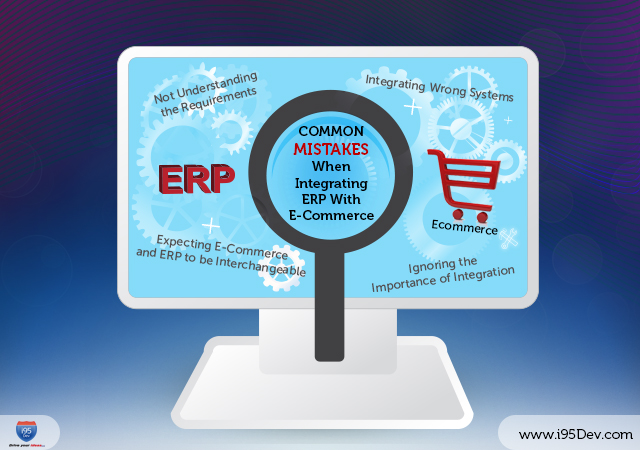Common Mistakes When Integrating
ERP with eCommerce

Not Understanding the Requirements
Perhaps the most detrimental pitfall in the process of integration is misunderstanding the technical requirements necessary to interconnect each system. It can not only lead to cost and time overruns but also complicate the process further down the line. Businesses looking to integrate systems must clearly understand each system’s technical specifications. Proper documentation on each system will help smooth the path ahead. Building the right team with important stake holders who are experienced with each system is crucial.
Integrating Wrong Systems
Most businesses in their initial phase of operation start with basic systems in place. As the business grows and order volume increases, the business often cobbles together new systems, instead of getting a proper system. While integration will definitely help streamline the process, the overall operational efficiency is limited by the quality of the component systems it connects. Hence, before investing in integrating your existing systems, it is important to understand whether those component systems are scalable and will be able to efficiently meet the increase in demand. Investing in the right systems – then integrating them – is crucial to achieve the desired benefits.

Expecting E-Commerce and ERP to be Interchangeable
Your ERP and e-commerce systems are two very different animals which were designed to meet very specific requirements. With integration, we are enabling the two disparate systems to talk to each other but we cannot expect one system to replace or replicate the functionality of the other. Business managers must understand the intricacies of each system, limitations of each system and what can – and cannot – be achieved with integration. Businesses will still use their ERP for many of the same functions. The key difference will be the real-time synchronization of data between the two systems.
Ignoring the Importance of Integration
There is a widespread myth in the e-commerce industry that integration between an ERP and e-commerce system is much less important than it is. Many believe that once the e-commerce store and ERP are in place, integration is merely an afterthought that should require minimal resources and effort. Often this leads to problems during the project phase, when the importance of the process is realized much too late. Why invest so much effort in building an e-commerce platform and having a backend ERP if both are not integrated properly, resulting in critical information remaining in silos, unsynchronized? Considering integration to be a low-priority task has always backfired, resulting in unrealized potential had the systems been geared to properly interact with each other by sharing vital information about products, sales and customers. Proper integration will yield better results from a strategic, operational standpoint.
How can i95Dev help?
No matter your segment of e-commerce, whether retail, wholesale or manufacturing, you may want to consider the benefits of integrating your ERP with your e-commerce store. To avoid these pitfalls, reduce overhead and increase sales, please feel free to connect with us at http://www.i95dev.com/contact/or give us a call at 301.760.7499.



